- Joined
- Aug 20, 2022
- Messages
- 17,680
- Points
- 113
Who are the activists jailed in Hong Kong's largest national security trial?
18 hours agoYvette Tan and Koh Ewe
BBC News
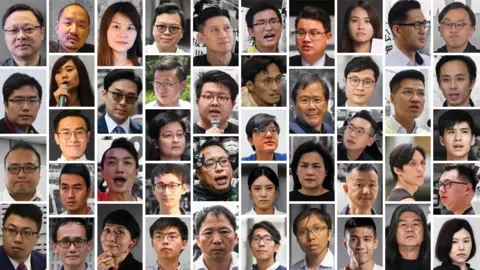
Forty-five people were sentenced to jail for subversion
The group known as the Hong Kong 47 include some of the city's biggest pro-democracy figures.
They were charged in 2021 under a controversial national security law (NSL) imposed by China. On Tuesday a court in Hong Kong sentenced 45 of them to jail terms ranging from four to 10 years. Two defendants were acquitted earlier in the year.
Officials accused the eight women and 39 men of trying to overthrow the government by running an unofficial primary to pick opposition candidates for local elections. Most of the defendants either pleaded guilty or were convicted of conspiring to commit subversion.
Some are famous figures like Joshua Wong and Benny Tai, icons of the 2014 pro-democracy protests that rocked Hong Kong.
There are also well-known opposition lawmakers Claudia Mo, Helena Wong, Kwok ka-ki and Leung Kwok-hung who is also known as Long Hair.
But many like Owen Chow, Ventus Lau and Tiffany Yuen represented a new generation of vocal activists. Mr Lau and Mr Chow were among hundreds who stormed LegCo and spray-painted Hong Kong's emblem in what became a pivotal moment in the 2019 protests.
What is Hong Kong's tough new security law?
Then there are those who were not involved in politics but were galvanised by the 2019 protests - social workers like Hendrick Lui, entrepreneurs like Mike Lam and a former nurse, Winnie Yu.
Most of the defendants have been in jail since the arrests in early 2021, as pre-trial detentions have become the norm under the NSL.
Laurence Lau, a barrister and former district councillor, and Lee Yue-shun, also a former district councillor, were acquitted in May.
The professor - Benny Tai
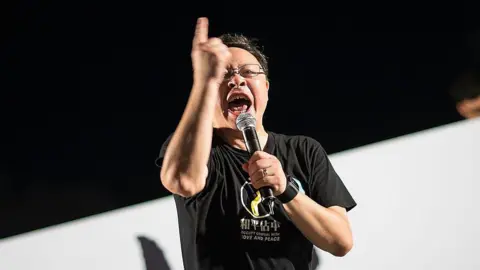
Benny Tai made his foray into politics in 2013
One of the main organisers of the 2020 primary, Tai has been labelled by China as a “hardcore troublemaker” for allegedly advocating Hong Kong independence and describing the Communist Party’s rule as a “dictatorship”.
A scholar and law professor, Tai first rose to prominence in 2014 when he founded the pro-democracy Occupy Central movement along with two others.
It was a historic civil disobedience campaign that called for fair and free elections in Hong Kong, and saw hundreds of thousands take to the streets.
In 2019, Tai was sentenced to prison for his role in the Occupy Central protests.
A year later, after the NSL was imposed, he was fired from his tenured job at the prestigious University of Hong Kong (HKU) over his criminal conviction.
Tai accused the university of bowing to Chinese pressure and called it the “end of academic freedom” in the city.
By then, he was already facing accusations of subversion under the NSL for organising the primary.
He has been sentenced to 10 years in jail.
The student - Joshua Wong
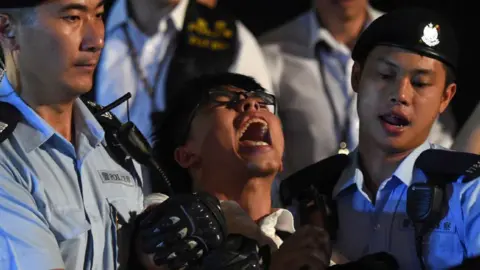
Joshua Wong is arguably one of Hong Kong's most recognisable faces
Arguably Hong Kong’s most famous pro-democracy activist, Wong’s journey into activism started when he was just 14.
By 2014, he had become the face of the Umbrella Movement, a mass student protest with the umbrella as a symbol, which sprang up alongside the Occupy Central sit-in.
He was just 20 when his activism landed him in jail, the first of what would be several convictions.
In 2019, Hong Kong erupted in months-long protests as hundreds of thousands marched against a hugely controversial extradition bill that would allow Hongkongers to be sent to mainland China to face trial.
Wong was among thousands who held a 15-hour siege of police headquarters in the Wan Chai district, pelting the building with eggs and spraying graffiti on its walls, in June that year.
While the demonstrations at that time were widely seen as a spontaneous “leaderless" movement, prosecutors said he led that particular protest, pointing to a video of him calling for the crowd to "completely besiege police headquarters”.
He was jailed for his role in them, and placed in solitary confinement.
But he remained defiant after pleading guilty: “Perhaps the authorities wish me to stay in prison one term after another. But I am persuaded that neither prison bars, nor election ban, nor any other arbitrary powers would stop us from activism.”
He was still serving his sentence when he was charged with subversion under the NSL.
Now, at 28, he has received a sentence of four years and eight months on Tuesday.
The 'revolutionary' - Long hair
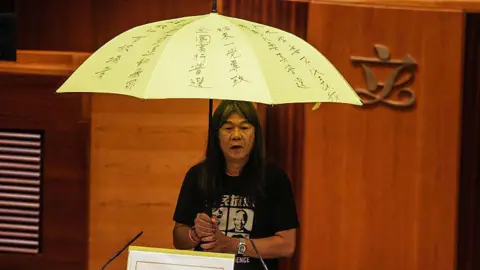
Leung Kwok-hung held a yellow umbrella in parliament as a form of protest
Former opposition lawmaker Leung Kwok-hung, better known as Long Hair for his coiffure, once described himself as a “Marxist revolutionary”.
The 68-year-old was known for his political theatrics - one of his signature moves involved hurling bananas as a sign of protest. When he was sworn in again as a lawmaker in 2016, he released a balloon with a political banner and held a yellow umbrella, declaring that the “Umbrella Movement would never end”.
This got him disqualified from the council. He was arrested and had repeated stints in jail for taking part in the 2019 protests.
After the NSL was imposed in 2020, he married his long-time partner, Vanessa Chan, also known as Chan Po-ying, who is a prominent activist. They were among the founding members of a political party, the League of Social Democrats.
They said they decided to marry because should one of them be jailed, they would have greater legal rights such as prison visitation.
Forty days after the wedding, Leung was charged.
He has been jailed for six years and nine months.
The longtime activist - Claudia Mo
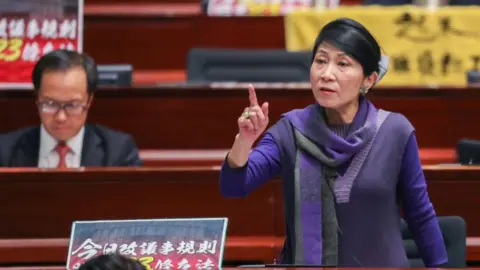
Claudia Mo previously covered the Tiananmen crackdown as a journalist
Claudia Mo, known affectionately in Cantonese as Auntie Mo, was a prominent opposition lawmaker.
She had been a journalist at the AFP news agency, where she covered the 1989 Tiananmen Square crackdown in Beijing.
The 67-year-old helped set up the opposition Civic Party in 2006 and by 2012 she had won a seat in LegCo. She gave up British citizenship to hold office in Hong Kong.
She was among 15 lawmakers who resigned en masse from LegCo after four pro-democracy lawmakers were ousted in November 2020. The move left LegCo with no opposition presence.
"We had to," she said at the time. "We need to protest against what could be the ultimate Beijing crackdown on Hong Kong - to silence the last bit of dissent in the city."
Police "smashed through into the living room" to arrest her in the early hours of 6 January 2021, the FT reported, citing an unnamed source who described the raid as "sheer thuggery".
She has been in jail since then. When her husband, British journalist Philip Bowring, was critically ill, Mo was not allowed to visit him from prison.
She was sentenced to four years and two months in jail.
The LGBT campaigner - Jimmy Sham
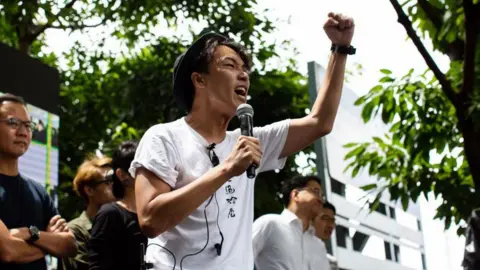
Jimmy Sham is a prominent LGBTQ activist
A long-time political and LGBTQ activist, Jimmy Sham also led one of Hong Kong’s largest pro-democracy groups, the Civil Human Rights Front (CHRF).
The group disbanded in 2021, saying it could no longer operate amid “unprecedented” challenges posed by China’s crackdown.
Sham was violently attacked several times in 2019, and in one instance, was left on the streets with a head injury. The CHRF accused government supporters of this and other assaults against pro-democracy activists at the time, but it was never proven.
The 37-year-old married his partner in New York in 2013 and fought for Hong Kong to recognise overseas same-sex marriages. Hong Kong’s top court granted him a partial victory in 2023 when it ordered the government to establish a framework to recognise same-sex partnerships.
By then, Sham was in detention for his role in the Hong Kong primary.
He has been repeatedly denied bail, with a judge saying he was a “determined and resolute young man” who would likely continue to commit “acts endangering national security” should he be released.
He was sentenced on Tuesday to four years and three months in jail.
The journalist - Gwyneth Ho
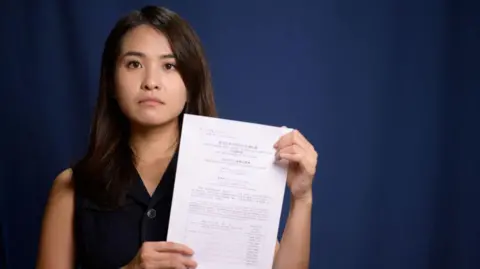
Gwyneth Ho shot to fame when she inadvertently live streamed herself being beaten up
Before pivoting to politics, 33-year-old Gwyneth Ho had worked for several news at outlets - including BBC Chinese, government-run broadcaster RTHK and Stand News.
She shot to fame during the 2019 protests when she was beaten up by a mob while reporting on the movement. The attack landed her in hospital.
She ran in the 2020 primary and won a high number of votes in her constituency.
She said during her trial that it was “inevitable” that the 12 pro-democracy candidates, including her, were disqualified from contesting the legislative elections.
“I believe that most Hongkongers knew deep down in their hearts that fighting for democracy under the Chinese communist regime has always been a fantasy,” she said.
She has been sentenced to seven years in jail.


